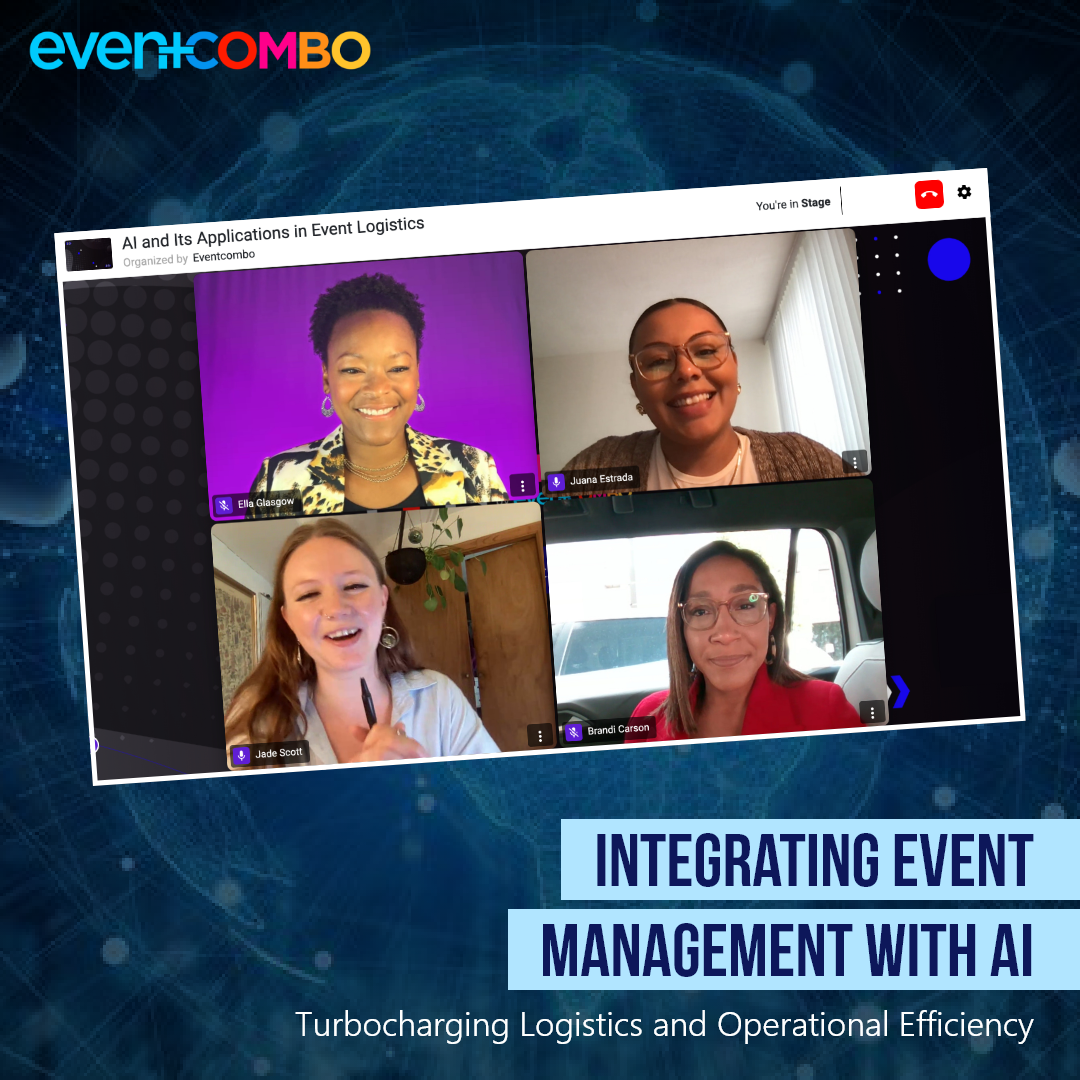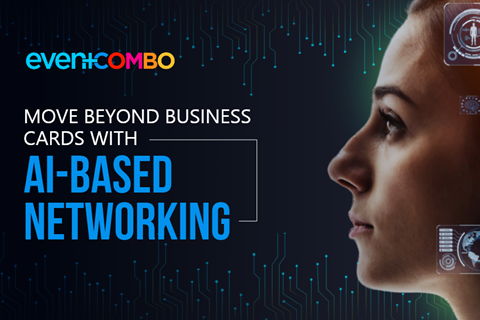

Here's the thing: Artificial Intelligence (AI) is not a futuristic superpower in a distant reality anymore. It is here and taking the world by storm. AI technology is being adopted by various industries, including the event industry, to save time and streamline operations.
AI is optimizing various aspects of events, including creating immersive and visually attractive experiences, ensuring event security, driving marketing efforts, and assisting event planners with logistics for in-person events. It is also helping event organizers process huge amounts of data, create automated workflows, and save time—all the while enhancing quality of their live events.
While COVID-19 did skyrocket the popularity of virtual events, in-person events have made a strong comeback, as evidenced by the 95% of marketers who agree that in-person events are more effective in achieving business goals.
Given the boom in this event sector, it is not surprising that the event logistics industry is expected to grow at a CAGR greater than 4.5% from 2023 to 2028. Thus, optimizing logistics for your event to deliver a standout experience to attendees is more important than ever, making it a field of opportunities for artificial intelligence innovation.
One of the guests in Eventcombo’s recent panel discussion on AI and Its Applications in Event Logistics, Brandi Carson, CSEP, Published Event Planning Consultant and Event Project Manager, highlighted a very crucial point. She explained AI technology assists in execution of core responsibilities like logistics planning and related tasks so that event planners don’t waste time on tasks that can be easily automated.
What Is Event Logistics?
Broadly speaking, event logistics refers to the preparation and coordination of technical and administrative support services to guarantee smooth execution of an event. These services include physical and intangible elements such as event handouts, merchandise, venues, transportation, and registration platforms. Ella Glasgow, CEO & Executive Producer, Beyond Virtual Events, another panelist at the event, elaborated how AI is enabling us to move faster with the execution of ideas and coordination of logistical elements in today’s fast-paced world where time is always running out.
What Are the Key Elements of Event Logistics?
Here is a list of key elements involved in event logistics:
5 Ways Artificial Intelligence Can Optimize In-Person Event Logistics
1. Smart and Targeted Marketing - Use artificial intelligence to source the right audience segments for your events and market them hassle-free. AI makes sense of all customer data gathered from customer data platforms (CDPs) and finds potential customers you can target with social media and other marketing campaigns. With 88% of event organizers using social media for their events, implementing AI for intelligent marketing campaigns is a no-brainer.
Digital marketers can use AI to identify trends based on demographics and geography and tweak their marketing campaigns for optimized results. Logically speaking, this makes it easier to locate places or platforms where you can promote your in-person events. So, once you extract relevant customer information, you can use those insights to create targeted social media posts and emails for your ideal audience.
Solutions like Eventcombo can prove to be useful here, with their array of customizable features for graphics, sign-up forms, emails, messaging, and language. Our event management platform also helps streamline your workflows by integrating with over 100 third-party applications like Salesforce, Slack, QuickBooks, Zapier, HubSpot, etc.
2. Connecting Planners to Vendors - An in-person event's success greatly depends on the quality of vendors you engage for different functions. Be it supplying refreshments, procuring set equipment, or branding event swag, you need to find the right vendors, who have the experience of catering to the particular kind of event you're hosting, have the resources to overcome any last-minute challenges, and, most importantly, seamlessly communicate with you at all times. The quality of vendors you engage depends on the type of event you are hosting, the venue location, and your specific event needs. Finding them can be challenging, but AI can help you do this better.
There is a large inflow of software applications that are using intelligent AI matchmaking to connect event planners with the right vendors. The innovators have a complete understanding of the frustration and stress that goes into planning an event, and that's why they are continuously trying to improve their AI-based search engines.
3. Event Registration - When you think about registering for an event, especially a popular in-person one, do you also visualize waiting behind hundreds of interested attendees in a never-ending queue to fill out a registration form and pay on-site manually? Well, not anymore! AI-powered registration systems now enable participants interested in attending your in-person event to register and pay online, even at the venue. An AI-powered registration system effectively streamlines the event registration process and makes it more efficient.
The traditional on-site registration procedure is time-consuming and leads to long queues and waiting times. However, with cutting-edge technology platforms that have seamlessly adopted AI-powered registration systems, attendees are now able to register and pay online, saving time for everyone involved and significantly reducing the number of people who need to register on-site. Also, attendees can use their mobile devices to check in, eliminating the need for physical tickets and reducing the risk of lost tickets and ticket fraud.
4. Chatbots for Event Support - Though chatbots are more popular with virtual events, they can also be used to increase the efficacy of event functions in in-person events. Chatbots can be implemented on any scale for an event, and they can provide consistent and event-specific information to attendees in real time. Chatbots are the ideal event support team, operating before, during, and after the event.
“Chatbots are an element of event logistics and making them more responsive and interactive using AI can drastically enhance efficiency”, says Juana Tatiana Estrada, Event Manager at Latinas in Tech, another stellar panelist at the event.
In a logistical sense, AI chatbots can be implemented as stationary or mobile (hello, robots!) information kiosks where event guests can ask their queries and receive answers that help them experience the event personally. The latest versions are already able to gather insights from an individual attendee's ticketing behavior and curate a customized event experience for them. They even recommend like-minded attendees you can meet at your event based on certain preferences and intelligent search capabilities. Chatbots help you save time and focus on more important event matters instead of consistently answering questions about the "where's" and the "when's" of event activities. They can also deliver a customized guest experience by guiding your attendees to the activities they'd like to participate in (based on their interests) and even extract real-time insights about their reactions and satisfaction levels.
5. Event Security - In the case of in-person events with hundreds, possibly thousands of attendees, ensuring security is a top priority, and the future of event security relies on AI technology. Artificial intelligence can play a big role here with technology like facial recognition, voice recognition, biometric registration, and more.
We can expect to see more self-check-in booths where attendees can register for the events by themselves, and organizers can account for every participating individual. While facial recognition can make check-ins more secure and a seamless endeavor by reducing the need for human oversight, video surveillance can scan attendees as they pass through venue entries, eliminating the need for a human to check their pass and verify identities.
Since AI security systems have the unique signature of every visitor sanctioned to be at the venue, it can effectively prevent badge-swapping or the misuse of stolen badges. Although artificial intelligence systems can be expensive to install when compared to the costs of hiring staff and equipping them for communication (think walkie-talkies) across the venue and investing time to brief them about various aspects of the guest list, the former is a better option.
Event profs can envision the future of event logistics powered by AI technology. With new innovations in artificial intelligence and machine learning spaces, event management stands to become a lot simpler, all the while delivering a more personalized attendee experience. Jade Scott, Director of Events and Operations at Masterclassing, also the moderator and guest speaker at Eventcombo’s event, however, illuminated a very crucial yet ignored aspect about the use of AI. She emphasized that it is our collective responsibility to also be protective of our surroundings while adopting new technologies and AI is no exception.
AI can assist you in better and faster event planning, improving participant engagement, tightening security and event safety, capturing attendee data and feedback for reviewing the success of your current event, and planning strategically for the next one. The outcomes of incorporating artificial intelligence into your next in-person event can be rewarding, with improved ROI and attendee satisfaction at the forefront.

Networking is one of the most valuable ways to discover boundless opportunities and for 77.7% of business professionals , in-person conferences open a greater scope to make rewarding connections.

When planning a healthcare fair, the goal goes beyond booking a venue and sending out invites. You’re creating an event that brings together healthcare professionals, researchers, and exhibitors, all seeking value and...

Diversity and inclusion are at the heart of the events industry, where planners are focused on creating experiences that bring together people from all walks of life.